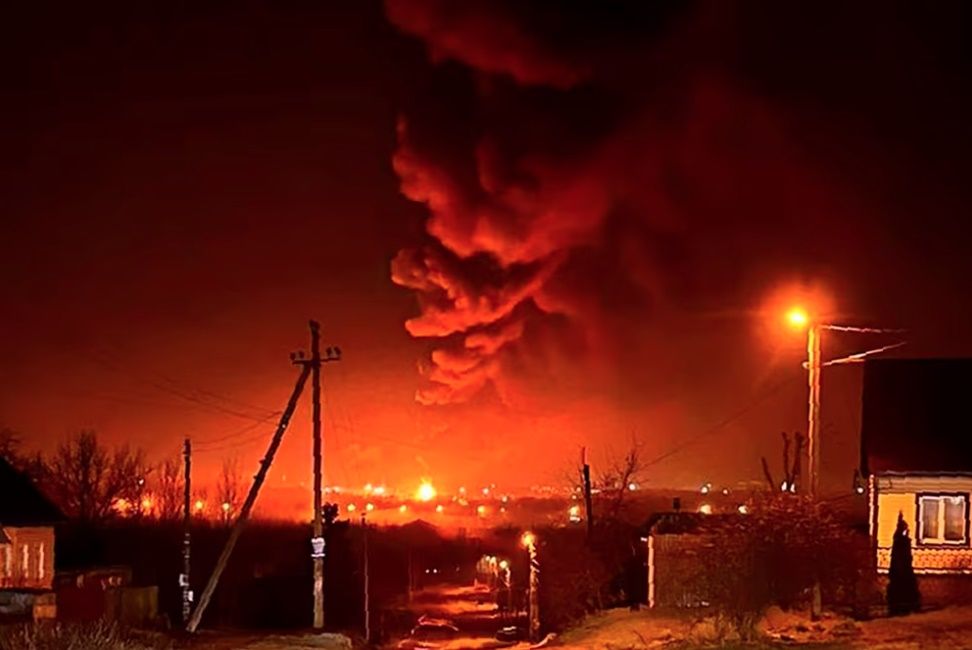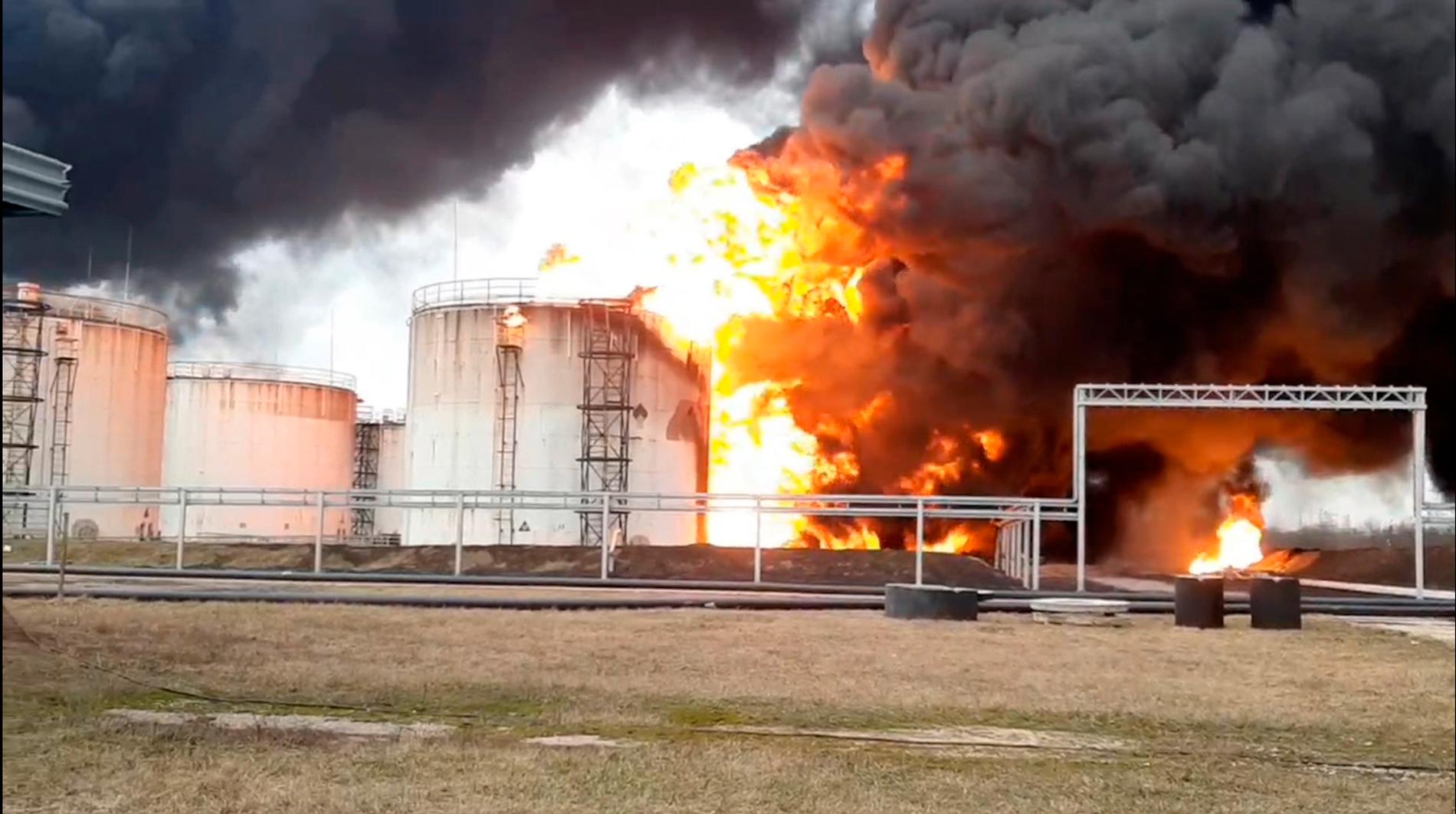Fires and explosions in Russia: - May be Ukrainian sabotage groups

There have been explosions and fires in a number of strategically important places in Russia in recent weeks - without either the Russians or the Ukrainians helping to give us answers as to why.
VG.NO - By - OLE KRISTIAN STRØM - Published: 28.04.22 kl. 20:45
- There are still many who believe Ukraine is behind these fires and explosions, not least as several of them have been aimed at military installations, oil depots and weapons depots, says military expert Ilmari Käihkö at the Swedish Defense College to VG.
- We do not know what is happening. In principle, it can be accidents, but now feels like a pattern. It is difficult to see that everyone is about accidents. If the fires continue and will continue to be linked to the war, it feels reasonable to think that it is Ukrainian special forces or sabotage groups that are behind it, Käihkö believes.
He is a lecturer at the Swedish National Defense College, and believes it is natural that Ukraine, like Russia, attacks the enemy's logistics.
Here are fire cases that VG has registered:
- On April 1, a large oil depot in Belgorod was set on fire. The Russians have said that two Ukrainian helicopters set it on fire. Ukraine has not admitted anything.

- On April 21, a fire broke out at a research institute affiliated with the Russian military in the city of Tver. According to Tass, six people died and 27 were injured. The fire is said to have spread over an area of around 2,500 square meters and several floors. No explanation has been provided for the cause of the fire.
- The same day, a fire broke out in a large chemical plant in the city of Kineshma, about 400 kilometers northeast of Moscow. It was the Dmitrievsky factory in the city that was on fire and burned down.
- An oil depot was set on fire in the town of Bryansk. The fire could be seen from a long distance. The oil depot is not far from the Ukrainian border. The fire has received little coverage in the Russian media.
- There was a fire in another oil depot this day as well. Reuters reported that it was subject to Rosneft, but was in the same area as the other depot.
- On the same day, a fire was reported in at least one factory in Bryansk associated with food production. Some reports said that a slaughterhouse was on fire, but this has received little or no attention in the Russian media. Eyewitnesses posted photos on social media .
- In Ussuriysk in the far east of Russia, heavy smoke came on Monday, according to local residents, who posted material on social media. Some claimed it was at an air base. This fire has not been confirmed by Russian authorities.
- On the night before Wednesday, reports of explosions in several Russian provinces came close to the border with Ukraine, and there were pictures of an ammunition depot in Belgorod that was on fire.
Researcher Ina Holst-Pedersen Kvam at the Norwegian Defense College The Naval Academy puts the fires in context in this way:
While Bryansk is in itself a central "logistics hub" for the Russian war of aggression in Ukraine, the two oil depots in the city are important for two reasons. While one was a civilian oil depot that supplied Europe with Russian oil, the other was reserved for military use where the loss is likely to have an immediate negative effect.
- The oil depot in Belgorod, which was also on fire earlier in April, was similarly central to Russian forces along the Ukrainian eastern front.
She says that the research institute in Tver has been a "key player in the development of the next generation of national target missiles and air defense".
- Now the Kremlin does not exactly tend to care much about international law unless these facilitate the regime's well-known victim role and generally rowdy behavior, but attacking such key targets in the counterparty's supply lines and military "backbone" is in any case completely within such treaties, she believes.
The powerful Russian TV boss Margarita Simonjan is clearly in no doubt that there are Ukrainian attacks on Russian soil - and writes this:
- Minor count
Kvam says Russia has similarly tried to stifle Ukrainian defense capabilities in various ways. But she points to a significant difference:
- In the Ukrainian defense, this main artery now extends far into NATO member countries, which continuously supply the front with increasingly advanced weapons, the researcher states.
The expert points out that in contrast to Ukrainian forces and sabotage groups, which have a large concentration of the Russian "logistics tail" within reach of the border, the Russians, for their part, are limited to attacking similar targets within Ukrainian territory alone.
- The majority of these offensives have therefore just focused on bombarding the facilities, infrastructure and communication lines that are necessary for the reception and transmission of Allied weapons.
Kvam says that in a military context, it generally gives less "payoff" to wait until this is in place rather than neutralize the threat at a distance before it can be established at all.
- This does not mean, however, that Russian forces will not succeed in weakening Ukrainian "life nerves" in the long run. On the contrary, especially last week's successes in cutting supply lines in the southeast may in that case have provoked the Ukrainians' need for similar retaliation, says Kvam.
Not Russians
Neither Ilmari Käihkö nor Professor Jardar N. Østbø at the Department of Defense Studies in Oslo believe the fires are a Russian provocation:
- If there was talk of Russian provocation, the accusations from the Russian side would probably come quickly. Considering how the war is going at the moment, I can not quite see what Russia would need such a provocation for. It would be a double-edged sword, as it would be an admission of one's own weakness, says Østbø to VG.
He understands well that the Russians keep a low profile in the coverage of these cases:
- The other explanatory alternatives, ie Ukrainian attack from outside, Ukrainian and/or Russian sabotage, or that there have been pure accidents, all point to the same thing, albeit to varying degrees: Russian weakness and/or incompetence, whether it concerns defense or security if only "only" lack of object protection or fire protection, Østbø states and points out the "Moscow" shipwreck.
- That Russian authorities claim that it was due to an accident, says his. It is the least embarrassing explanation, where all the options are humiliating anyway.
- In any case, everything fits into a picture that things are definitely not as they should be in Russia, Professor Østbø concludes.
- I also do not think it is due to provocations from the FSB or the theory that I see on social media, that it may be about internal Russian resistance. There is absolutely no proof of that, says Ilmari Käihkö at the Swedish National Defense College.
COPYRIGHTS
Copy & Paste the link above for Yandex translation to Norwegian.
WHO and WHAT is behind it all ? : >
The bottom line is for the people to regain their original, moral principles, which have intentionally been watered out over the past generations by our press, TV, and other media owned by the Illuminati/Bilderberger Group, corrupting our morals by making misbehavior acceptable to our society. Only in this way shall we conquer this oncoming wave of evil.
Commentary:
Administrator
HUMAN SYNTHESIS
All articles contained in Human-Synthesis are freely available and collected from the Internet. The interpretation of the contents is left to the readers and do not necessarily represent the views of the Administrator. Disclaimer: The contents of this article are of sole responsibility of the author(s). Human-Synthesis will not be responsible for any inaccurate or incorrect statement in this article. Human-Synthesis grants permission to cross-post original Human-Synthesis articles on community internet sites as long as the text & title are not modified